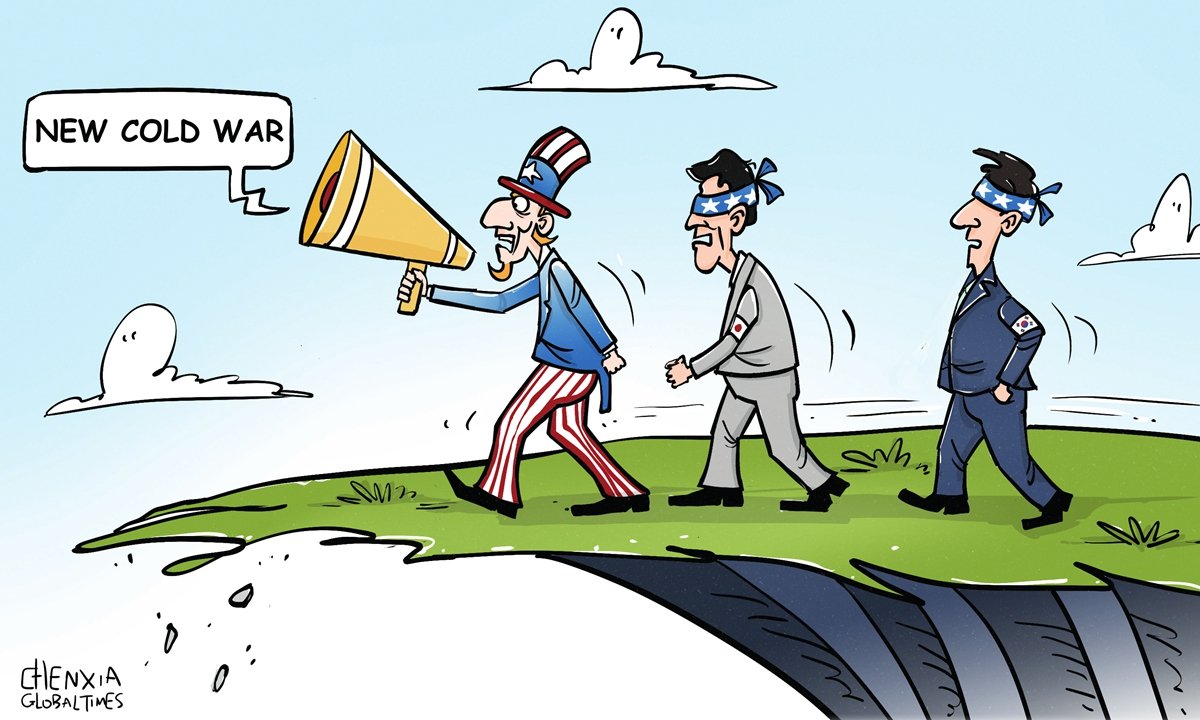Despite assurances from US President Joe Biden that the US-Japan-South Korea summit at Camp David wasn’t focused on China, post-summit discussions seemed to suggest otherwise. The three nations discussed “joint efforts to maintain peace and stability” in the Taiwan Straits and South China Sea, with critics alleging this showcased an underlying anti-China sentiment.
This landmark trilateral summit was hosted by Biden with South Korean President Yoon Suk-Yeol and Japanese Prime Minister Fumio Kishida. The leaders announced plans for increased cooperation, hinting at making this gathering an annual tradition. Additionally, Biden’s plans to foster US influence in the Indo-Pacific involve a significant agreement with Vietnam next month, further drawing Vietnam into the US sphere during heightened tensions with Beijing.
Chinese analysts are apprehensive, suggesting that the US aims to ignite a bloc confrontation in Asia. They claim the US uses its allies to contain and compete with China, ultimately disturbing regional peace. They also assert that the US’s attempts to entice nations like Vietnam will be short-lived and won’t deter them from their traditional relationships with China.
Key Highlights of the Camp David Summit:
The summit at Camp David, a presidential retreat situated 112 kilometers from the White House, resulted in significant announcements:
- The three countries vowed for stronger military and economic cooperation, jointly condemning perceived aggressive actions by China in the South China Sea.
- Biden, without directly referencing China, confirmed the nations’ pledge to ensure peace in the Taiwan Straits and counter economic coercion.
- Commitments include routine military exercises, ballistic missile drills, and collaborations in economic security, particularly semiconductor supply chains, cybersecurity, artificial intelligence, and regional initiatives for maritime security.
- They plan to launch a supply chain early-warning system, specifically for critical minerals used in electric vehicle batteries.
US national security adviser Jake Sullivan stressed that the trilateral partnership wasn’t directed against any country, but for a free, open, secure, and prosperous Indo-Pacific vision.
Yet, Chinese commentators felt differently. They believe that while the trilateral group hasn’t established a defense commitment like NATO, the underlying sentiment indicates an inclination towards such unity. The idea being, a threat to one nation is seen as a threat to all three.
South Korean leader Yoon added that any attack on one of the countries would strengthen their combined resolve. There’s growing concern among Chinese observers about the formation of a mini-NATO designed to counter China’s influence.
Implications of the Summit:
Military expert Song Zhongping hinted that the formation of a mini-NATO would depend on institutionalizing such a framework in each nation. Li Haidong, a professor at China Foreign Affairs University, emphasized the deviation of Biden’s perspective from prior administrations. Li contends that these efforts primarily serve US competition with China, and the aim is to weaken China’s developmental prospects.
Moreover, Li argued that the US and its allies exploit regional situations to legitimize their strategic competition with China. Wang Wenbin, spokesperson for the Chinese Foreign Ministry, urged nations to maintain peace and true multilateralism. Chinese analysts also indicated that domestic political changes could affect the trilateral unity, especially considering current political dynamics in South Korea and Japan.
Regional nations, including North Korea and Russia, are keeping a close watch, suggesting that the US’s aggressive steps could incite assertive reactions.
Vietnam’s Role:
Biden is slated to finalize a strategic partnership with Vietnam in September. The collaboration intends to boost Vietnam’s high-tech sectors, including semiconductor production and artificial intelligence.
However, Li highlighted that the dynamics between the US and Vietnam primarily arise due to US-China tensions. Vietnam, under the Communist Party of Vietnam, is anticipated to be cautious about getting involved in the US-China rivalry. Wang Yi, a senior official from the Communist Party of China, emphasized the shared goals and collaborations between China and Vietnam, ensuring their relations remain strong.
Tran Luu Quang, Vietnam’s Deputy Prime Minister, reaffirmed China’s unparalleled significance to Vietnam. He emphasized the depth of Vietnam-China ties and the priority of their relationship in Vietnam’s foreign policy.
Concluding, Li pointed out the shared interests of the Communist Parties of China and Vietnam, implying that the US’s endeavors to use Vietnam against China might be in vain.
Read More:
